|
Genres, Themes, Actors, and Directors:
- At Sea
- Charles Laughton Films
- Clark Gable Films
- Donald Crisp Films
- Franchot Tone Films
- Mutiny
- Ruthless Leaders
- South Sea Islands
Response to Peary’s Review:
Peary writes that this “classic sea drama” about “a historical mutiny that took place in the 18th century on a British ship making a two-year voyage to retrieve breadfruit plants from Tahiti” still “holds up” well today. He argues that while the “film hasn’t the sense of adventure, eroticism, or psychological complexities of the 1962 remake with Trevor Howard and Marlon Brando… or the revisionist 1984 film, The Bounty, starring Anthony Hopkins and Mel Gibson”, it remains “the superior film”, and that “its power comes from neither Bligh nor Christian ever backing down from each other during an argument, even when the other has the upper hand.” In Alternate Oscars, however, Peary amends his assessment by noting it’s “too grouchy a picture”, given that “for two hours we see Laughton demean sailors and get away with it”; he asserts it’s not a film “you want to see every time [it turns] up at a repertory cinema or TV.” Meanwhile, he notes that while “Laughton’s Bligh is a villain for the ages, one of the most contemptuous figures in cinema history”, he believes “the role lets him down because it is without nuance — there is no way we can get into his head, no way to figure out if something in his past was responsible for his cruelty.”
I’m essentially in agreement with Peary’s points. While Mutiny on the Bounty is an impressive production on nearly every count — from the on-location shooting to meticulous set design (both historical ships were recreated), expert editing, and fine performances — it is challenging to watch Bligh’s (fictionalized) behavior and then see him retaining loyalty from a reasonably large group of men, who are either deathly afraid of treason and/or believe his behavior is somehow justifiable. In addition, the film is a tad overlong, with too much time spent lingering on romantic dalliances in Tahiti (where the female characters aren’t given any dimensions other than beauty and loyalty). However, enough about this adventure-filled nautical movie remains powerful and well-crafted that it’s certainly worth a look by all film fanatics.
Redeeming Qualities and Moments:
- Charles Laughton as Captain Bligh
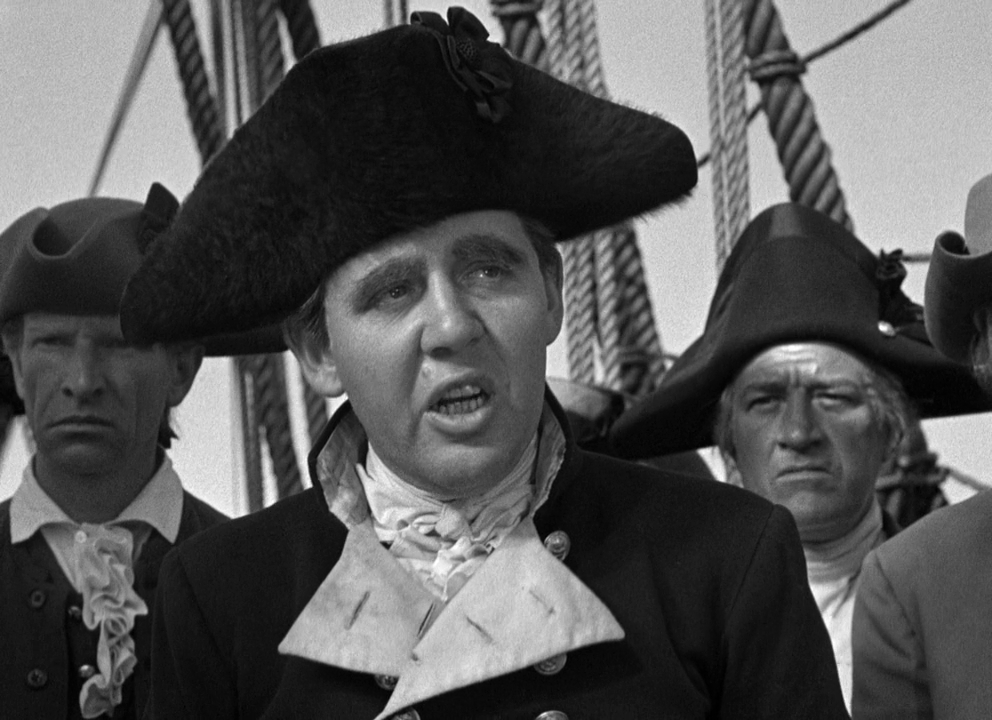
- Clark Gable as Christian Fletcher
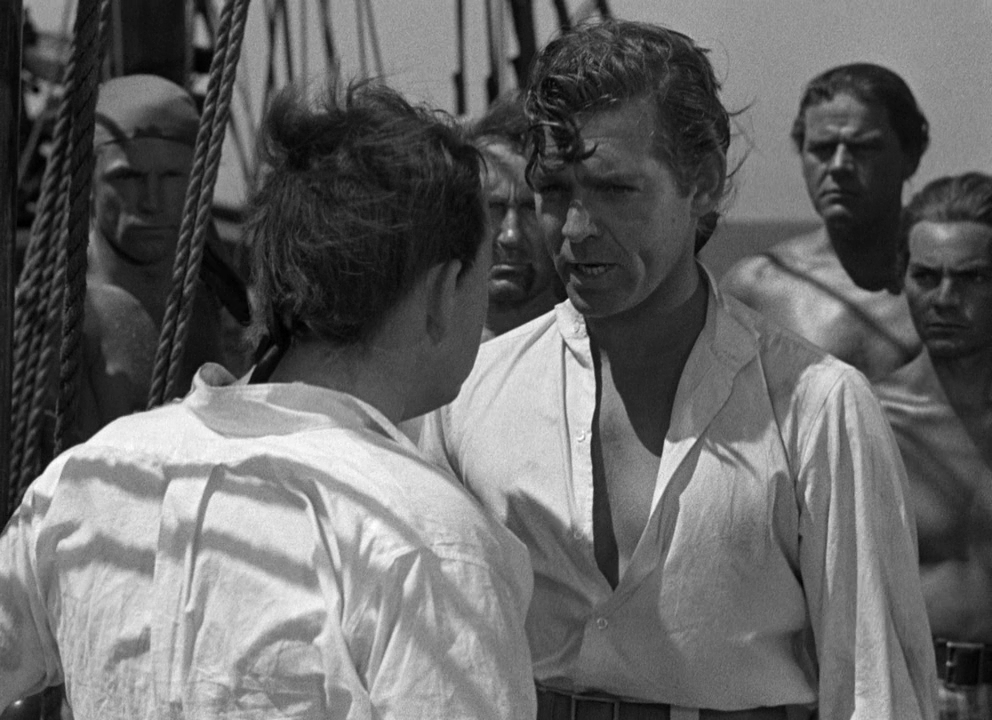
- Arthur Edeson’s cinematography
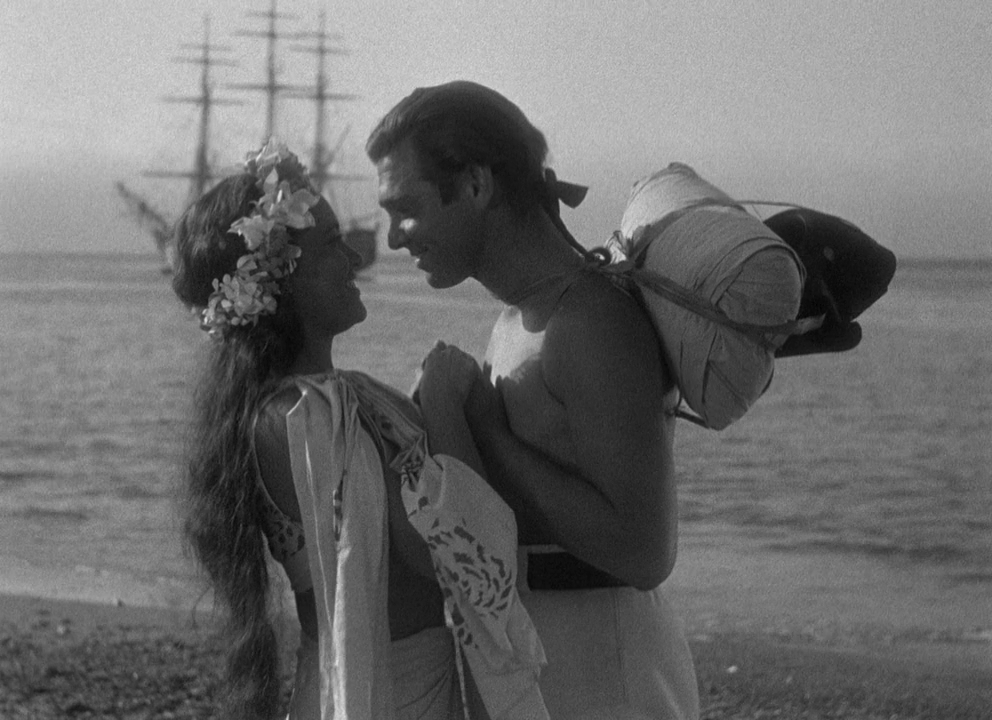

- Margaret Booth’s masterful editing
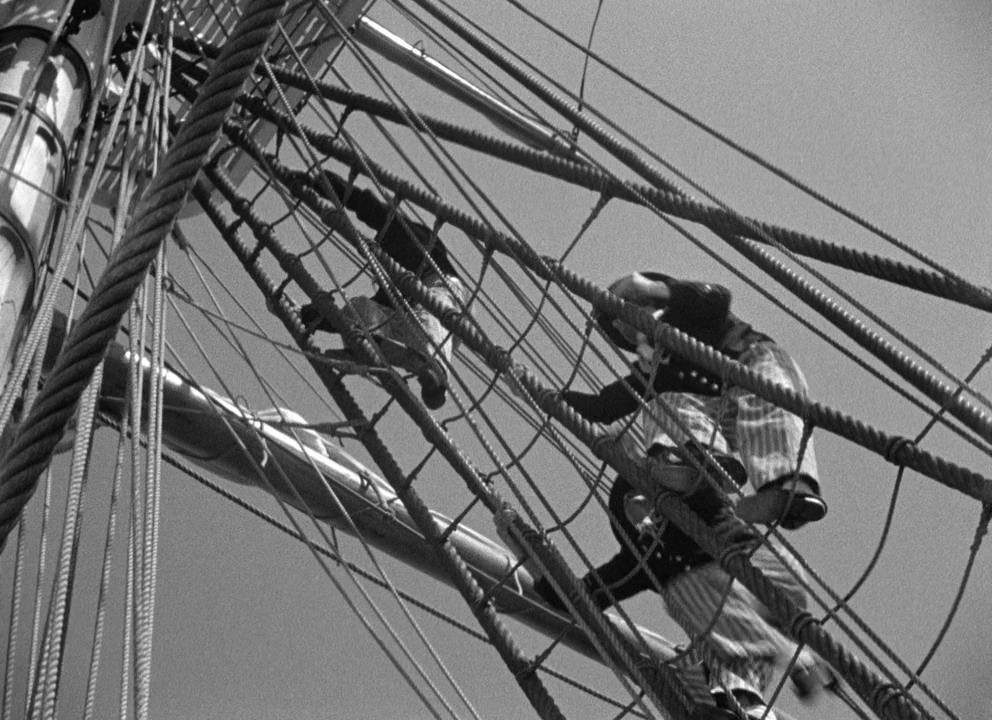
Must See?
Yes, as an Oscar-winning classic.
Categories
(Listed in 1001 Movies You Must See Before You Die)
Links:
|
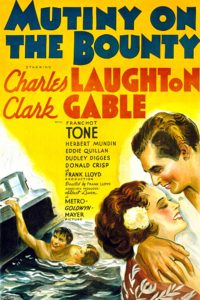





One thought on “Mutiny on the Bounty (1935)”
First viewing. A no-brainer must-see, as a nearly perfect film from start to finish – with flawless direction and performances.
I was shocked when I realized I hadn’t seen this film before. I suppose I thought I had seen it – but, now, I think what I previously saw were clips from the film and not the film itself. At any rate, I’m certainly glad to have corrected this ‘error’.
I haven’t seen the two remakes so I can’t speak on them or, obviously, how the original compares. Nevertheless, I can’t at all understand Peary’s criticism of the original as lacking in a sense of adventure and psychological complexities – when the film is absolutely full of both! He also mentions a lack of eroticism – which may have been an element in one or both of the remakes (and Peary certainly does love eroticism) but which has all but nothing to do with the overriding narrative.
(From what I gather, the original takes some liberties with the actual truth of the true story while remaining accurate overall.)
Frank Lloyd’s direction could not be better – and this must have been a fierce production to keep under control (even though it may have come a little more easily to Lloyd, having directed seafaring tales before). I was almost in awe of the tightness of the film – and there isn’t a single sequence that I didn’t find riveting.
As for the lead performances (though the entire cast is rather splendid)… it’s possible that I never saw Laughton, Gable and (especially) Tone give better ones. They each have a very firm control over the through-line of their characters (and, along those lines, Tone is particularly effective in his defense speech at the trial). In other films, Gable can often get by with swagger and personality but here he had to do more than that (and his work in this role is really only just about equal to his performance in ‘Gone With the Wind’… though I’d gamble by saying he’s better in ‘Mutiny’).
As for Laughton, I wouldn’t agree with the idea that the role lets him down because we don’t get to learn more about what makes Bligh the way he is. Why do we need or want to know more? Why would we care about him that much? Who gives a shit?; he’s a maniacal asshole – and it’s Laughton’s bravery as an actor that refuses to shy away from that fact (which is certainly all right there in the script). Bligh doesn’t retain loyalty. There’s a moment when one of the crew is so pissed off that he finds his hand is near a knife and almost makes to pull on it to strike Bligh. Bligh notices the move and… simply… walks slowly in the man’s direction to stand near him. The man – scared shitless – then pulls his hand away. The men, I think, simply behave like men without a union behind them. Hence… the mutiny.
What’s especially frightening about Bligh is his untiring determination to hunt Christian down. He goes after him like Captain Ahab going after Moby Dick.
~which brings us to the moment I was fooled into thinking the film was almost over when it wasn’t. When a British ship nears Pitcairn Island and Christian decides to set sail in another direction, I thought the film was about to end there (the music supported that thought and, in a way, the film *could* have logically ended there) but it doesn’t. ~which can give way to the thought that the film is too long.
But I don’t think so. It’s at that point that the film gets its second powerful wind, setting us up for the trial (which is another of many high points in the film).
I guess I can’t say enough good things about ‘Mutiny’. I sit through so many so-so (or bad) films that I certainly sat up and took notice when something this massive (on a number of levels) and massively satisfying came my way. True, I may not want to see it a number of times… but I’ll certainly look forward to watching it in blu-ray.